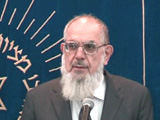- Sections
- Parashat Hashavua
6
Speech gives man special standing within creation, which consists of the inanimate, growing, living, and above that, speaking. When the Torah describes Adam’s passage from "living" to "speaking," it says "He blew into his nostrils the breath of life, and man became a living spirit" (Bereishit 2:7). Onkelos translates this as: "… man became a speaking spirit." We note that the same root is used for the blowing that Hashem did to give us our soul, which comes "directly" from Him. Man’s spirit finds expression in practice in speech, as his "lips" give an outlet to his cognitive side. Rav Kook, in Orot Hatorah (1:2), wrote that the root of the Oral Law is higher than that of the Written Torah. Following in Rav Kook’s footsteps, we suggest that the expression Torah Sheb’al Peh (Oral Law, literally, on the mouth) stresses the importance of speech and its connection to the mouth. Since the mouth’s main job is to grant access to da’at, we can appreciate the pasuk "the lips of knowledge are the precious vessel."
Da’at is important even before it enters the physical world through the mouth. Thought is man’s way of connecting to the world that is beyond physicality. The more abstract a thought, the more transcendental it is. The great riddle is how someone who is "created from earth" can approach the Maker. The pasuk of Hashem blowing a soul into an earthen body is part of the paradox.
The answer is that thought allows us to connect to Torah, which is our entrée to "divine thought." It enables us to express our thoughts within the world of the Oral Law. Prophecy, which is an expression of great closeness to Hashem, is often called "davar," which shares a root with dibbur (speech). Yeshayahu prophesies that Mashiach will possess a spirit of Hashem, various types of wisdom, and fear of Hashem (11:2). He will usher in a period of da’at filling the land "like water covers the seabed" (ibid. 9). Our generation has thankfully seen a "flood" of Torah, with more people studying it seriously than ever before. The goal is to grow our connection to our Creator. At Creation, water covered the whole world and a divine spirit hovered over the water.
We now need to make the importance of Torah study not just clear to certain sectors, but to the whole nation. This requires that those who are involved in Torah join in the country’s security obligations, and thereby avoid a perception that a life of full-time Torah is a tool to receive special privileges. Rather, the da’at that the Torah engenders must spread great light and a special uniting between Hashem and His nation.

More on MtDNA
Rabbi Yossef Carmel | Tevet 2 5777

The Leader Sinned
Rabbi Yossef Carmel | Adar II 5 5782

“You Shall Do for Me a Sanctuary... Tabernacle”
Rabbi Yossef Carmel | 28 Shvat 5768

Parashat Hashavua: The Song from the Depths of the Soul
Rabbi Yossef Carmel | Nisan 5785

Shir Hyichud on Yom Kippur
Rabbi Yoel Lieberman | 5573

Parashat Vayechi - Questions
Various Rabbis | 5772

The Mitzvah of “Duchening” - Birchas Kohanim
Rabbi Yirmiyohu Kaganoff | 5769







